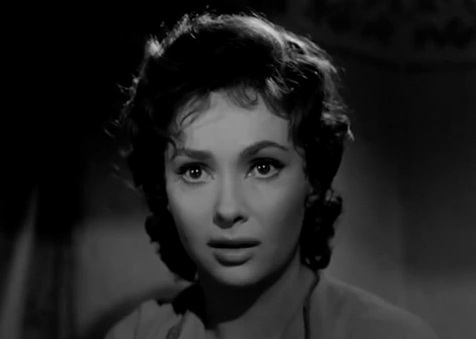“When I watch them today, my movies seem even better.” This is what Gina Lollobrigida used to say, not with self-complacency but because there is truth in it. Those movies shaped our collective imagination. If we watch them, if we look at those actors, directors, stories, at those incredibly beautiful actresses who made the history of cinema, photography, and glamor, we understand they have a different allure. They are deep and far away but very contemporary and future-oriented at the same time. We recognize the stardust, that poignant yet charming patina of time, something our modern HD screens cannot pay justice to. In truth, the crystal-clear hyper-realism of today’s images can’t quite reach the same levels of expressivity.
Or, perhaps, it’s just the melancholy of looking back and realizing time passes, or catching a glimpse, in that elegant black and white, of our lost youth and how it used to make everything more beautiful. Or was it the stories, the refined dialogues, and the elegance of people’s manners that make the difference? Everything seemed more naive, even when it was transgressive, simpler and barely sketched out, even when it was supposed to be innovative.
Let’s talk about her, our diva, our Lollo Nazionale, who was also “so Hollywood.” She left us at 95, taking away with her another piece of the world – ethereal and languid, sensuous yet elegant and refined – of the first half of the 20th century. With her, we lost another slice of life as it was in the 1940s and 1950s, of dolce vita felliniana, even though she didn’t participate in it, in the movie: upon reading the script, her husband said it wasn’t suitable for her. But can you imagine it, the marvelous and talented Gina Lollobrigida and Marcello Mastroianni together?
She was a diva, that is, the embodiment of charm, beauty, and of the ability to attract people’s looks and attention by simply walking by. For her, it wasn’t just about beauty, though, because Gina Lollobrigida had plenty of talents and intelligence, she was immense in her art and in her craft. And let’s not forget her personality, her temperament, and her bravery in going against the grain.
In his book Dive del Cinema, Francesco Costa discusses the subject of cinematic muses from an interesting angle: rather than making a list of international divas as the object of desire of millions of people, he presents what they achieved. The effects they had on the collective imagination of men and, especially, women: “My book – the author said in an interview with AGI – is a hymn to the force and courage of the actresses who brought to light female strength and creativity in western culture and who, by moving forward in an environment where making it, for an actress, was incredibly hard, led the way for all women.”
More than an overview of portraits of 20th-century artists, Costa’s book is a reflection on a model, on seventy women starting from Italian silent cinema stars, moving to the Hollywood lionesses of the 1930s and to the muses of nazi-fascist cinema. After the war, they would leave all sorrows behind to become glitzy and glamorous Hollywood divas and, from the 1960s onward, they would rebel against all canons to become symbols of women’s emancipation.
“Italian divas breached through the constrictions and obligations that harnessed the women in their audience – Costa underlines. They were beautiful and seductive and, on screen, they would mock the ideal of masculinity by leading powerful men, unable to resist them, to madness and suicide.” When discussing Italy’s post-war cinema and presenting to his readers the timeless, seductive charm – different in each of them – of Magnani, Mangano, Loren, Lollobrigida, he writes that: “While Italy was rising from its ashes, divas experienced a moment of unrepeatable happiness. It was a time when the figlie del popolo, the daughters of the people, found in cinema a way to redeem a life filled with sacrifices and renunciations. Beautiful and brave, they’d learn English and go to Hollywood.”
Indeed, they no longer traveled to America as migrants, as “third-class people.” They were no longer victims of the humiliation of Ellis Island, they didn’t know the pain of carrying a cardboard suitcase. Nor were they confined into Little Italies as enemy aliens during the war. they traveled to America as stars. they were photographed, admired, cherished, and worshipped.
They represented true, deep cultural and social redemption for millions of Italians and Italian-Americans. fabulous women, fierce and fearless, they managed to plan their path toward success with plenty of foresight and no fussiness, and they walked that path until they became international cinema icons. They are stars shining for their beauty, talent, style, training, and art still today. They may no longer shine here on Earth, just like Gina Lollobrigida, but on the screen, where we’ll always see them, ethereal and determined at once, they’ll remain eternally bright.
“A vederli oggi, i miei film sembrano più belli”. Così diceva Gina Lollobrigida, non tanto per autocompiacimento ma perché effettivamente, a riguardarli, a vedere quegli attori, quei registi, quelle storie, quelle attrici bellissime che hanno fatto la storia del cinema, della fotografia e dei red carpet, che hanno costruito la nostra memoria collettiva, si scorge un allure differente: profonda, lontana eppure avveniristica e attuale. Si coglie la polvere di stelle, quella struggente e affascinante patina del tempo che l’HD dei nostri schermi digitali non riescono a restituire. Anzi l’iperrealismo, la cristallinità dell’immagine, tante volte sembrano non riuscire a raggiungere quei livelli espressivi.
Forse, però, è solo l’occhio malinconico di chi guarda indietro e vede passare il tempo o ritrova in quel bianco e nero elegante, la giovinezza perduta che rende tutto più bello. Oppure erano le storie, la raffinatezza dei dialoghi e l’eleganza dei modi a fare la differenza? Ci sembrava tutto più innocente anche quando era trasgressivo, più semplice e sbozzato quando era avanguardia.
Prendiamo lei, la diva, la Lollo nazionale ma anche molto hollywoodiana, che andandosene a 95 anni ha portato via con sé un po’ di quel mondo etereo e languido, sensuale ed elegante, signorile e raffinato della prima metà del Novecento. Con lei se ne è andato un pezzo di quel mondo anni ’40 e 50’ e la dolce vita felliniana che pure non la vide protagonista, proprio in quel film: il marito, leggendo il copione, non lo ritenne adeguato alla moglie. Ma ve la immaginate Gina Lollobrigida, meravigliosa e talentuosa, accanto a Marcello Mastroianni?
Diva, cioè incantevole incarnazione del fascino, della bellezza, della capacità di attirare gli sguardi e l’attenzione al solo passare. Nel suo caso, non basta un’ammirazione fine a se stessa, perché di talenti e intelligenza, di arte e mestiere, Gina Lollobrigida ne aveva da vendere. Senza dimenticare il carattere, il temperamento, il coraggio di andare controcorrente.
C’è un libro di Francesco Costa che tratta l’argomento delle muse cinematografiche con un taglio interessante: più che essere un elenco di protagoniste femminili del cinema internazionale, oggetto del desiderio di milioni di persone in tutto il mondo, mostra il loro punto di arrivo: la ricaduta sull’immaginario collettivo, maschile certo ma soprattutto femminile: “Il mio – ha detto l’autore di “Dive del Cinema” in un articolo dell’agenzia Agi – è un inno alla forza e al coraggio di quelle attrici che hanno portato alla luce la forza e la creatività femminile nella cultura occidentale e che, riuscendo a farsi strada in un settore dove la strada riservata alle attrici era a dir poco impervia, hanno illuminato il cammino di tutte le donne”.
Così, più che essere una carrellata di ritratti che percorre il Novecento, è una riflessione su modello in cui si susseguono settanta donne che partono dal cinema muto italiano e arrivano alle leonesse di Hollywood degli anni Trenta, diventano le sirene del cinema di regime negli anni del Fascismo e del Nazismo, per poi lasciare tutti dolori alle spalle e trasformarsi nelle dorate e luccicanti star hollywoodiane fino a ribaltare tutti i canoni dal Sessantotto in poi, per esprimere il lungo tragitto dell’emancipazione femminile.
“Le dive italiane aprirono un varco nelle costrizioni che imbrigliavano il desiderio di libertà delle spettatrici – sottolinea Costa – belle e seduttive, sullo schermo si prendevano gioco del maschio e portavano uomini di potere alla follia e al suicidio, incapaci di sottrarsi al loro richiamo”. Poi passando in rassegna il cinema dell’Italia del dopoguerra, facendoci scorrere davanti agli occhi il fascino senza tempo e seducente, ciascuna a suo modo, della Magnani, della Mangano, della Loren, della Lollobrigida, ecco cosa scrive: “Mentre l’Italia risorgeva dalle sue macerie, il divismo femminile visse una stagione di irripetibile felicità. Era il periodo in cui le figlie del popolo vedevano nel cinema l’occasione per riscattare infanzie di sacrifici e rinunce. Belle e coraggiose, imparavano l’inglese e approdavano a Hollywood”.
Sì, andavano in America non più da emigranti, persone di terza classe, vittime delle umiliazioni di Ellis Island, delle fatiche e dei dolori della valigia di cartone, dei confinati nelle Little Italy e come enemy aliens in tempo di guerra. Ma da star. Fotografate, ammirate, coccolate e venerate.
Un vero, profondo, riscatto sociale e culturale per milioni di italiani e italo-americani.
Favolose donne fiere e intraprendenti, capaci di decidere senza capricci ma molta lungimiranza, la strada da percorrere verso il successo, e poi brave a percorrerla fino a diventare icone del cinema mondiale, non solo italiano o americano. Stelle che brillano come modelli di bellezza, bravura, stile, preparazione e arte ancora oggi. Possono spegnersi quaggiù, come Gina Lollobrigida, ma dentro quegli schermi che ne proiettano immagini eteree e determinate al tempo stesso, resteranno sempre luminose, brillanti, eterne.






























